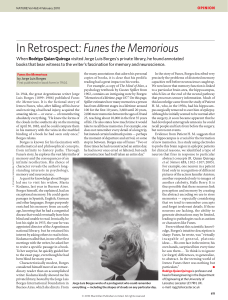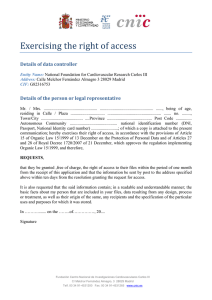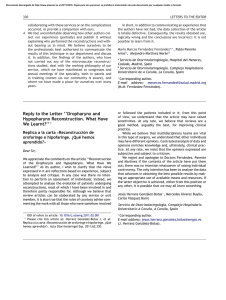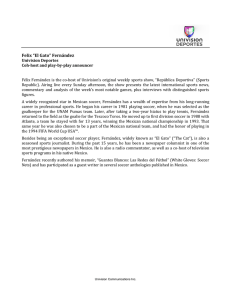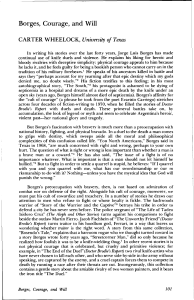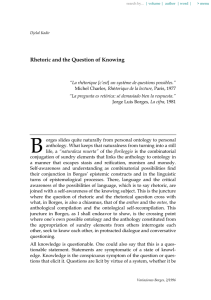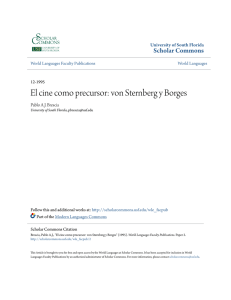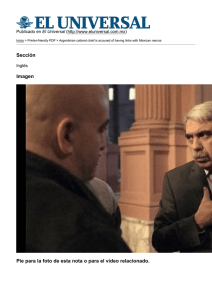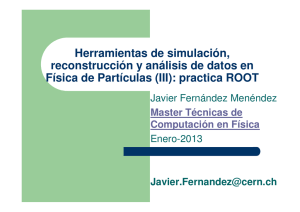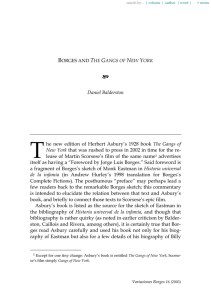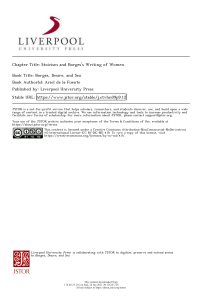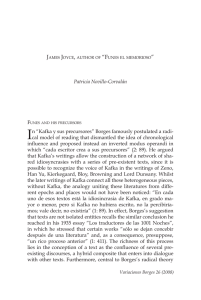WJ and Borges Again
Anuncio
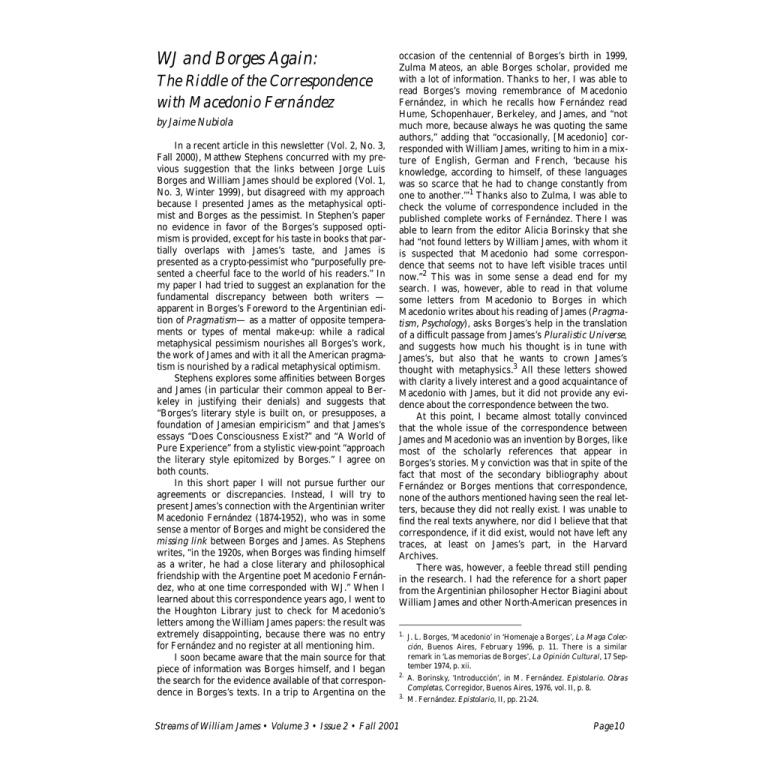
WJ and Borges Again by Jaime Nubiola WJ and Borges Again: The Riddle of the Correspondence with Macedonio Fernández by Jaime Nubiola In a recent article in this newsletter (Vol. 2, No. 3, Fall 2000), Matthew Stephens concurred with my previous suggestion that the links between Jorge Luis Borges and William James should be explored (Vol. 1, No. 3, Winter 1999), but disagreed with my approach because I presented James as the metaphysical optimist and Borges as the pessimist. In Stephen’s paper no evidence in favor of the Borges’s supposed optimism is provided, except for his taste in books that partially overlaps with James’s taste, and James is presented as a crypto-pessimist who “purposefully presented a cheerful face to the world of his readers.” In my paper I had tried to suggest an explanation for the fundamental discrepancy between both writers — apparent in Borges’s Foreword to the Argentinian edition of Pragmatism— as a matter of opposite temperaments or types of mental make-up: while a radical metaphysical pessimism nourishes all Borges’s work, the work of James and with it all the American pragmatism is nourished by a radical metaphysical optimism. Stephens explores some affinities between Borges and James (in particular their common appeal to Berkeley in justifying their denials) and suggests that “Borges’s literary style is built on, or presupposes, a foundation of Jamesian empiricism” and that James's essays “Does Consciousness Exist?” and “A World of Pure Experience” from a stylistic view-point “approach the literary style epitomized by Borges.” I agree on both counts. In this short paper I will not pursue further our agreements or discrepancies. Instead, I will try to present James’s connection with the Argentinian writer Macedonio Fernández (1874-1952), who was in some sense a mentor of Borges and might be considered the missing link between Borges and James. As Stephens writes, “in the 1920s, when Borges was finding himself as a writer, he had a close literary and philosophical friendship with the Argentine poet Macedonio Fernández, who at one time corresponded with WJ.” When I learned about this correspondence years ago, I went to the Houghton Library just to check for Macedonio’s letters among the William James papers: the result was extremely disappointing, because there was no entry for Fernández and no register at all mentioning him. I soon became aware that the main source for that piece of information was Borges himself, and I began the search for the evidence available of that correspondence in Borges’s texts. In a trip to Argentina on the occasion of the centennial of Borges’s birth in 1999, Zulma Mateos, an able Borges scholar, provided me with a lot of information. Thanks to her, I was able to read Borges’s moving remembrance of Macedonio Fernández, in which he recalls how Fernández read Hume, Schopenhauer, Berkeley, and James, and “not much more, because always he was quoting the same authors,” adding that “occasionally, [Macedonio] corresponded with William James, writing to him in a mixture of English, German and French, ‘because his knowledge, according to himself, of these languages was so scarce that he had to change constantly from one to another.’”1 Thanks also to Zulma, I was able to check the volume of correspondence included in the published complete works of Fernández. There I was able to learn from the editor Alicia Borinsky that she had “not found letters by William James, with whom it is suspected that Macedonio had some correspondence that seems not to have left visible traces until now.”2 This was in some sense a dead end for my search. I was, however, able to read in that volume some letters from Macedonio to Borges in which Macedonio writes about his reading of James (Pragmatism, Psychology), asks Borges’s help in the translation of a difficult passage from James’s Pluralistic Universe, and suggests how much his thought is in tune with James’s, but also that he wants to crown James’s thought with metaphysics.3 All these letters showed with clarity a lively interest and a good acquaintance of Macedonio with James, but it did not provide any evidence about the correspondence between the two. At this point, I became almost totally convinced that the whole issue of the correspondence between James and Macedonio was an invention by Borges, like most of the scholarly references that appear in Borges’s stories. My conviction was that in spite of the fact that most of the secondary bibliography about Fernández or Borges mentions that correspondence, none of the authors mentioned having seen the real letters, because they did not really exist. I was unable to find the real texts anywhere, nor did I believe that that correspondence, if it did exist, would not have left any traces, at least on James’s part, in the Harvard Archives. There was, however, a feeble thread still pending in the research. I had the reference for a short paper from the Argentinian philosopher Hector Biagini about William James and other North-American presences in 1. J. L. Borges, ‘Macedonio’ in ‘Homenaje a Borges’, La Maga Colección, Buenos Aires, February 1996, p. 11. There is a similar remark in ‘Las memorias de Borges’, La Opinión Cultural, 17 September 1974, p. xii. 2. A. Borinsky, ‘Introducción’, in M. Fernández. Epistolario. Obras Completas, Corregidor, Buenos Aires, 1976, vol. II, p. 8. 3. M. Fernández. Epistolario, II, pp. 21-24. Streams of William James • Volume 3 • Issue 2 • Fall 2001 Page 10 WJ and Borges Again by Jaime Nubiola Macedonio Fernández, which had appeared in 1980 in a small journal in Salta, in the North of Argentina, but which fortunately had been reprinted the following year in the Hispanic Journal. When I received a photocopy of that old paper, I realized that it was almost the end of my search. In that brief but thoughtful scholarly paper, Biagini researched all the available sources about Fernández and his American connections, paying very special attention to the presence of James in Macedonio throughout his entire career, starting from his early reading of The Principles of Psychology in 1896 until the extremely admiring comments of Macedonio’s last years presenting James as “the more intelligent and with a greater philosophical spirit” (1944), who “will still be read in one hundred years” (1931).4 So what about the correspondence between James and Fernández? Biagini reconstructs the items of that correspondence between 1906 and 1910 from the philosophical texts of Fernández compiled in volume eight of his Obras Completas. In that volume I was able to read the fragments of three letters from James dated October of 1906 (pp. 39-40), the 3rd of November of 1908, and the 27th of August of 1909 (pp. 237-238). It might perhaps be useful to transcribe the English text of one of these letters according to Macedonio, because it is also relevant for my discussion with Stephens about the supposed “fake optimism” of James: There is now a more feeble thread still pending further research. In his valuable paper, Biagini writes that Macedonio’s admiration for James was unaltered throughout his long life, to the point of hanging a portrait of James above his bed, which James had sent around 1909.7 In a footnote Biagini adds that this photograph, with James’s signature, was in the hands of Macedonio’s son, Adolfo de Obieta. The next step should be to try to get in touch with Obieta or his heirs and to get a copy of that photograph and to publish it in Streams as the only remaining evidence of that old correspondence that affected Macedonio, who is hardly known today, so deeply and that through Macedonio was passed to Borges, one of the universal writers of the 20th century. —Jaime Nubiola is professor of philosophy at the University of Navarra, Spain. E-mail = [email protected] It touches me deeply to find myself taken so seriously by so evidently intelligent a man. Yes, it is the internal alegría which counts, and I like the 4 great perceptions which you ascribe to me, tho’ I do not commit my ‘theory of the emotions’ with any moral conclusions. Believe me, dear Sr. Fernandez, most sincerely yours. W. James.5 But the scattered remains of the letters mentioned in Fernández’s papers did not seem to me to be solid evidence. Could the whole thing be not an invention by Borges, but an invention by Macedonio? In a footnote Biagini states that Macedonio did not keep a copy of his letters and that the letters sent to him by James were lost. Biagini also reports having got in touch with I. K. Skrupskelis, who informed him that there were no traces of that correspondence extant in the archives and collections of James’s papers that exist in several countries.6 The track of the real letters was again lost. 4. H. Biagini, ‘William James y otras presencias norteamericanas en Macedonio Fernández’, Hispanic Journal, 2 (1981), p. 106. 5. M. Fernández, No toda es vigilia la de los ojos abiertos y otros escritos metafísicos. Obras Completas, Corregidor, Buenos Aires, 1990, vol. VIII, p. 238. (I have corrected spelling errors.) 6. 7. H. Biagini, ‘William James y otras presencias norteamericanas en Macedonio Fernández’, p. 108, n. 10. Streams of William James • Volume 3 • Issue 2 • Fall 2001 “‘William James, living in Cambridge, Massachusetts, U. S., Irving Street 95, sent me two photographs of him and several letters (...).” M. Fernández, No toda es vigilia la de los ojos abiertos y otros escritos metafísicos, p. 237. Page 11
